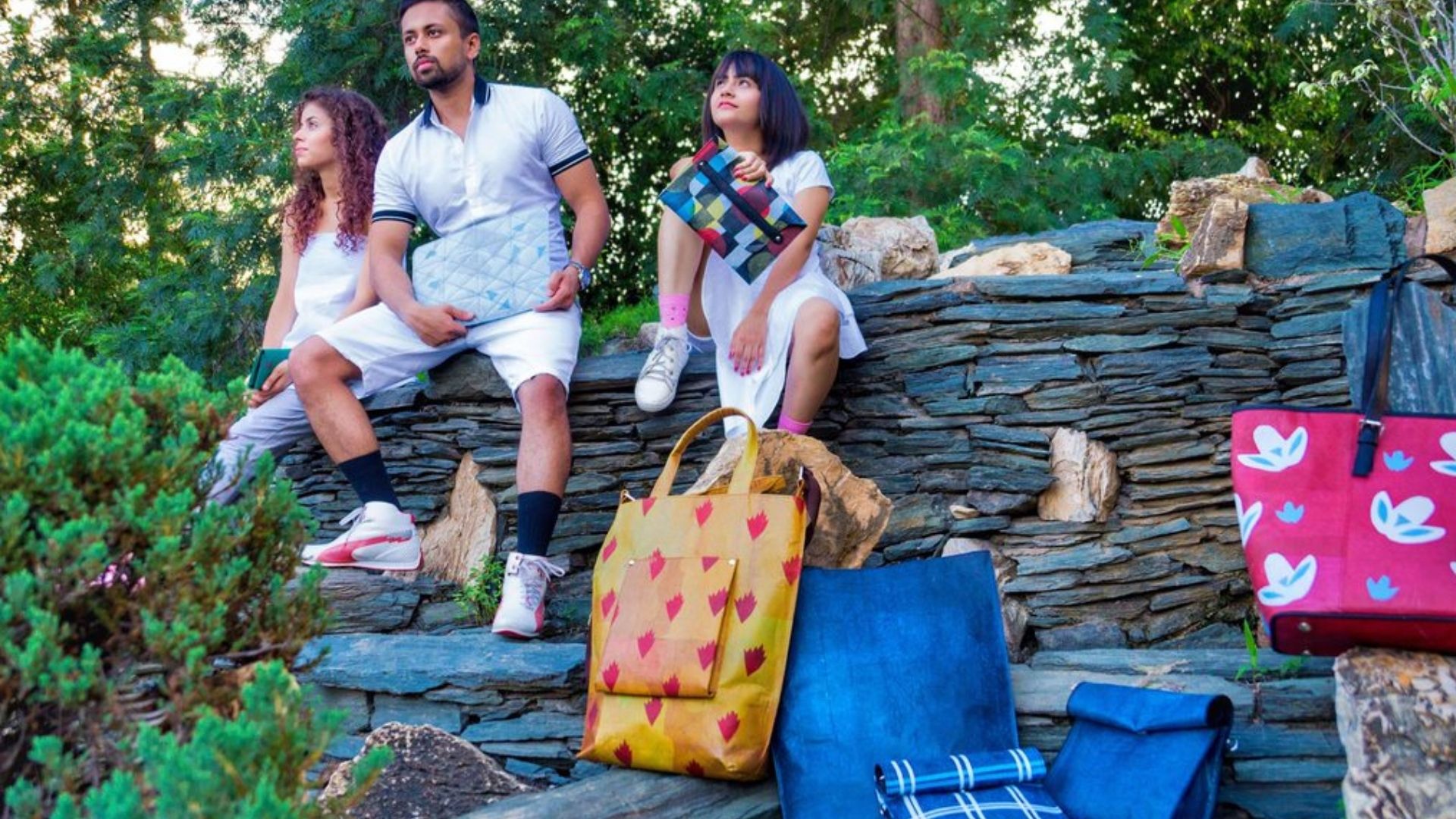Nexus-trained LIFAFFA partners with ragpickers to convert plastic waste into a leather-like material and create upcycled products.
July 2023

Upcycled products created by LIFAFFA from plastic waste. Photograph courtesy LIFAFFA
A New Delhi-based enterprise is helping ragpickers in India move from rags to riches. LIFAFFA partners with them to create stylish handbags and other products from plastic waste using an innovative production process.
“LIFAFFA was started with the aim to combat the twin problems of poverty and waste,” says founder Kanika Ahuja, who participated in the Climate Action Festival at the American Center in New Delhi in April 2023. “We aimed to create livelihoods for one of the most exploited classes of Indian society—the ragpickers. We realized that waste was the only available resource for them; plastics being the biggest problem at landfill sites.”
Ahuja decided to find a way that would give ragpickers, migrants and refugees a step up—increase their income by about 150 percent and address the growing issue of nonbiodegradable plastics in landfills.
“We developed proprietary technologies to convert plastic waste like plastic bags, wrappers, chips packets and plastic packaging into a type of vegan leather,” says Ahuja. The resulting fabric is called Handmade Recycled Plastic (HRP). “We use our material to create fashion accessories like handbags, backpacks, pouches, laptop sleeves and jewelry,” she says. “But the material can be used across industries to create furnishings, housing tiles, wallpaper, blinds, footwear, home décor, etc.” The resulting sales make the project self-sustaining. LIFAFFA showcased its new upcycled collection of handbags made from plastic waste during the Climate Action Festival.
LIFAFFA is the fashion brand of Conserve India, a nongovernmental organization founded by Ahuja’s parents to help combat pollution by efficient waste management and to empower the ragpicker community. Her work is bringing Conserve India into the social media era.
Conserve India originally used a concept similar to LIFAFFA to develop different types of products. As the world began to focus more on sustainability, Ahuja saw an opportunity to create an enterprise out of it that would empower even the lowest-income entrepreneurs through extensive training in product development and business fundamentals.
When Conserve India started working with the ragpicker communities, it realized the means to a sustainable business for them would be to utilize the only resource that they had freely and abundantly available to them—plastic waste. “This kind of plastic waste continues to be a low-value item even for today’s recyclers and is not collected or treated once it reaches the landfill site,” says Ahuja. “We developed a patented technology that could convert this low-value plastic into a thicker, vibrant and durable fabric, which we could use to design high-value products.”
Conserve India trains groups of ragpickers in collection and processing. “Many groups have organized themselves into self-help-groups and run their own profitable upcycling businesses supplying to Conserve and many other organizations,” says Ahuja.
Ragpickers collect, sort, clean and dry thin plastic bags. They are then layered to generate patterns and designs when they are compressed into sheets. Each sheet uses up to 150 grams of waste plastic bags, using much less energy than traditional recycling methods and releasing no toxic fumes. No dyes or chemicals are needed.
“At Conserve, we have cataloged over 5,000 designs that can be created using different layering techniques,” says Ahuja. The method can be applied to many sources of plastic waste, including household waste, industrial waste and ocean waste. Ahuja has been awarded by UN Women for youth Leadership and community engagement for gender equality by the Women Empowerment Principles Awards.
LIFAFFA received training at the Nexus Incubator start-up hub at the American Center New Delhi. “Being a part of Nexus has been fantastic,” says Ahuja. “The accelerator program took us through many essentials of running a start-up, re-evaluating our strategies and learning to play to our strengths, while the mentors worked with us one-on-one to strengthen our weaknesses.” Nexus also provided them access to strong networks and support organizations. “Being a part of Nexus goes beyond the scope of the program, and I’m truly happy to be a part of the Nexus family,” she adds.
Ahuja sees many opportunities in the future to take the company’s idea to the next level.
“Moving forward, we have exciting things lined up,” she says. “We are keen on licensing our patented technology to interested organizations, to create HRP fabric. We also have another patent in process for new and improved versions of upcycled fabrics.”
But the product itself is just one aspect of Ahuja’s plans.
“I have the groundwork ready, have some partnerships in place, have a very successful, demonstrated pilot and have technologies that the world needs now more than ever,” she says. “I look forward to taking this from a small successful pilot to a global standard in upcycling waste.”
Candice Yacono is a magazine and newspaper writer based in southern California.
This article was originally published in November 2019.
Click here to subscribe to the free SPAN newsletter: https://bit.ly/SubscribeSPAN
COMMENTS